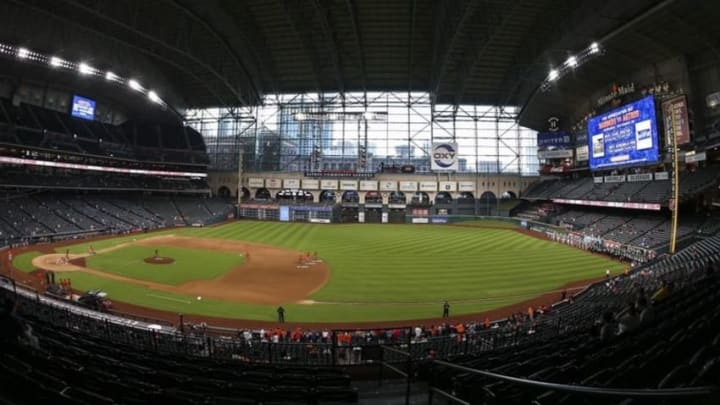Recently signed Cuban left-hander blasts the international signing process after agreeing to a new deal with the Astros.
What has been an interesting saga has taken yet another turn. After the Astros and Cuban pitcher Cionel Perez agreed to a restructured deal on Friday, Perez took aim at MLB’s international signing process. In a letter released by his agency, Perez says he feels “abused by this system.”
Cionel Perez signing contract today pic.twitter.com/zd53TwzT43
— Brian McTaggart (@brianmctaggart) December 9, 2016
This comes on the heels of the Astros giving Perez a $2 million signing bonus after the team voided the parties’ original deal. Signed in October, the original contract provided a $5.15 million bonus. Houston expressed concerns over Perez’s left elbow after conducting a physical and then voided the original deal.
Because the Astros have to pay a 100% luxury tax for overspending, the Astros spent $4 million. Listen to the Talking Stros podcast below to hear Brandon describe the situation.
What Perez takes issue with
Because the Stros signed Perez after voiding the original deal, they must add him to the 40-man roster before next year’s Rule 5 draft or risk losing him to another team. Perez is essentially arguing he is being treated as a previously signed player in this instance. He is not upset about the bonus pool rules.
Under the Collective Bargaining Agreement, any deal with a previously signed player is not subject to bonus pool rules. These rules state each team is allowed to spend a certain amount of money per year on international signing bonuses. Any team that exceeds its allotment by more than 15 percent must pay a 100 percent tax on every dollar spent beyond the allotment and is not allowed to give any signing bonuses of greater than $300,000 during the next two years.
After the Astros voided his contract, Cionel Perez argues that by rule, he should be exempt from the bonus pools: https://t.co/LfPlgI1kub
— Ben Badler (@BenBadler) December 13, 2016
The fact that the first deal was voided is not enough for Perez to be considered a previously signed player here. Therefore, the Astros still have to pay the tax on any signing bonus paid to Perez because they have exceeded their allotment for the year by roughly four times.
This also meant Perez was limited to only signing minor league deals, despite the fact that the Orioles expressed interest in offering him a major league deal. Perez primarily contends that if the CBA-treated him as a previously signed player, he could have received a better deal.
More from Climbing Tal's Hill
- Just how much better is the Houston Astros playoff rotation than the rest?
- Houston Astros: A Lineup Change to Spark Offense
- Astros prospect Hunter Brown throws 6 shutout innings in debut
- Always faithful Astros World Series champion Josh Reddick defends the title
- Michael Conforto declines Astros’ 2-year, $30 million offer
One important point is these CBA rules are established under the “old” CBA. The recently-agreed-upon new CBA’s rules take effect for the international signing period beginning July 2, 2017. The new CBA establishes a hard cap for teams’ international spending rather than allowing them to go over their cap and pay a tax. The dynamics of this process will, therefore, change beginning next summer.
Recent history
Interestingly, this is not the first time in recent Astros history that a left elbow has prevented a deal from being signed with an amateur player. The team drafted high school lefthander Brady Aiken No. 1 overall in the 2014 amateur draft. But concerns over Aiken’s elbow caused the Stros to pull their offer and not sign Aiken.
The Stros received the No. 2 overall pick in the 2015 draft as compensation for not signing Aiken. They used this pick to draft budding star Alex Bregman. Aiken subsequently underwent Tommy John surgery before the Cleveland Indians drafted him No. 17 overall in the 2015 draft.
Astros still get their man
Perez admitted the requirement that the Astros place him on the 40-man roster before the next Rule 5 draft was what swayed his decision to re-sign with the team that voided his original deal. He also asked MLB and the MLB Players’ Association to make changes to the rules accordingly.
Next: Astros Bullpen: Travis Wood an Option?
MLB.com ranked Perez as the No. 13 prospect in the Astros’ system. The left-hander possesses a mid-90s fastball, a slider and a changeup, and projects as a reliever or mid-rotation starter.
